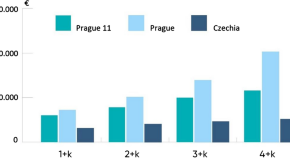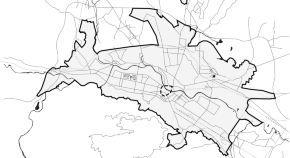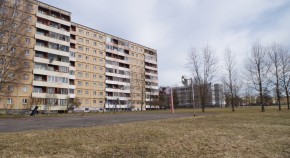Collection
Housing estates in the era of marketization – governance practices and urban planning
- Submission status
- Closed
Since the global turn towards neoliberal governance regimes at the end of the 20th century the commodification of housing, accompanied by the financialization of real estate, has not left any housing market or market segment untouched. This special issue, entitled “Housing estates in the era of marketization – governance practices and urban development”, contains 10 European case studies on how marketization has affected the governance of large housing estates across Europe. The collection includes novel contributions from well-studied countries such as France or the United Kingdom, cases from Scandinavia (Finland, Sweden) and Mediterranean (Spain) countries, as well as articles from a variety of post-socialist countries (Estonia, Lithuania, North Macedonia, Russia, Romania, Czech Republic). With this, the issue provides a yet unique collection of the diversity of experiences that have emerged in housing estates across Europe over the past two decades.
All articles focus on the interconnections between problems found in the development of housing estates and the processes of privatization and marketization. Collectively, the papers address two main research gaps: (1) we demonstrate that marketization and financialization, rather than being a challenge for housing policies, are now preconditions for the development of contemporary housing, incl. housing estate neighborhoods. Present-day housing policy and governance analyses thus need to live up to this state of affairs; (2) we address the need for an up-to-date pan-European overview on contemporary urban governance and planning practices related to LHEs, with the ambition to draw conclusions based on the extremely diverse institutional landscape of European countries (incl. from less studied cities of Central and Eastern Europe).
Editors
-
Kadri Leetmaa
Kadri Leetmaa holds a PhD in Human Geography from the University of Tartu, Estonia. Currently she works as the Director of the Centre for Migration and Urban Studies and an Associate Professor in human geography at the Department of Geography, University of Tartu. She is the member of the Scientific Board of the Leibniz-Institute for Regional Geography, Leipzig, Germany. Since 2017, she has served as the Estonian responsible coordinator of the Estonian National Contact Point of the EU territorial cooperation programme URBACT. Her research topics include, inequalities in urban and rural space and segregation, policies and planning, and more.
-
Matthias Bernt
Matthias Bernt is the acting head of the research area "Politics and Planning" at the Leibniz Institute for Research on Society and Space (Erkner) and adjunct professor at the Institute for Social Sciences at the Humboldt University in Berlin. He has formely worked as a research associate at the Helmholtz Centre for Environmental Research in Leipzig (2001–2008) and at the Institute of Sociology at the University of Rostock. Since 1998, he has held teaching positions at various German universities. He received his doctorate in July 2001 with a dissertation on Berlin's urban renewal policy.
Articles (11 in this collection)
-
-
Limits of and opportunities for urban planning and social change in decaying housing estates: Some lessons from Barcelona
Authors
- José-Ignacio Vila-Vázquez
- Petros Petsimeris
- Content type: Article
- Published: 07 April 2022
- Pages: 171 - 197

-
Taking a long view perspective on estate regeneration: before, during and after the New Deal for Communities in London
Authors
- Paul Watt
- Content type: Article
- Published: 18 February 2022
- Pages: 141 - 170

-
The changing position of housing estate neighbourhoods in the Helsinki metropolitan area
Authors
- Johanna Lilius
- Jukka Hirvonen
- Content type: Article
- Open Access
- Published: 24 August 2021
- Pages: 121 - 140

-
An uncertain future: prospects for Bucharest’s large housing estates
Authors
- Vera Marin
- Cătălin Berescu
- Zina Macri
- Content type: Article
- Published: 21 August 2021
- Pages: 101 - 119

-
Dwelling in failure: power and uncertainty in a socialist large housing estate regeneration program in Saint Petersburg, Russia
Authors (first, second and last of 4)
- Ekaterina Korableva
- Irina Shirobokova
- Matthias Bernt
- Content type: Article
- Published: 20 August 2021
- Pages: 85 - 99

-
Towards ordinary quarters: the development of housing estates in Prague after transformation
Authors
- Martin Ouředníček
- Zuzana Kopecká
- Content type: Article
- Published: 18 August 2021
- Pages: 61 - 84

-
Enlargement of apartments in socialist housing estates in Skopje under transition: The tension between individual preferences and collective action
Authors
- Jasna Mariotti
- Daniel Baldwin Hess
- Content type: Article
- Open Access
- Published: 26 June 2021
- Pages: 39 - 59

-
Privatization of large housing estates in France: towards spatial and residential fragmentation
Authors
- Christine Lelévrier
- Content type: Policy and Practice
- Published: 19 June 2021
- Pages: 199 - 217

-
Public space as a medium for emerging governance networks in post-privatised large housing estates in Tartu and Vilnius
Authors
- Johanna Pirrus
- Kadri Leetmaa
- Content type: Article
- Open Access
- Published: 11 June 2021
- Pages: 17 - 37

-
Trends of out-mobility from large housing estates in Stockholm: influences of the housing policy and neighbourhood context
Authors
- Kati Kadarik
- Anneli Kährik
- Content type: Article
- Open Access
- Published: 04 June 2021
- Pages: 685 - 704




